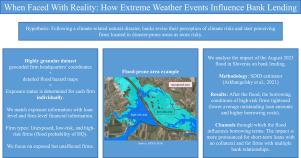When faced with reality: How extreme weather events influence bank lending
IF 6.9
2区 经济学
Q1 BUSINESS, FINANCE
Research in International Business and Finance
Pub Date : 2025-10-01
DOI:10.1016/j.ribaf.2025.103148
引用次数: 0
Abstract
We combine precise geolocation data on firms with detailed loan-level information to examine how an extreme weather event influences banks’ perceptions of climate-related risks. We focus on the severe flooding that occurred in Slovenia in August 2023 and analyse changes in the borrowing terms offered to firms situated in flood-prone areas that were not directly affected by the disaster. We find that banks revise their assessment of climate risk following the flood, as evidenced by tighter lending conditions for exposed firms. Specifically, high-risk firms experience a decline in outstanding loan amounts and an increase in borrowing costs. We also find some evidence that the impact is more pronounced for loans with short maturity and no collateral and less pronounced for firms with a relationship with a single bank.

面对现实:极端天气事件如何影响银行贷款
我们将公司的精确地理位置数据与详细的贷款水平信息结合起来,研究极端天气事件如何影响银行对气候相关风险的看法。我们重点关注2023年8月发生在斯洛文尼亚的严重洪水,并分析了向位于洪水易发地区的公司提供的借款条款的变化,这些公司没有直接受到灾难的影响。我们发现,银行在洪水过后修改了它们对气候风险的评估,暴露的公司的贷款条件收紧就是证据。具体来说,高风险企业的未偿贷款数额下降,借款成本上升。我们还发现一些证据表明,短期无抵押贷款的影响更为明显,而与单一银行有关系的公司的影响则不那么明显。
本文章由计算机程序翻译,如有差异,请以英文原文为准。
求助全文
约1分钟内获得全文
求助全文
来源期刊

Research in International Business and Finance
BUSINESS, FINANCE-
CiteScore
11.20
自引率
9.20%
发文量
240
期刊介绍:
Research in International Business and Finance (RIBAF) seeks to consolidate its position as a premier scholarly vehicle of academic finance. The Journal publishes high quality, insightful, well-written papers that explore current and new issues in international finance. Papers that foster dialogue, innovation, and intellectual risk-taking in financial studies; as well as shed light on the interaction between finance and broader societal concerns are particularly appreciated. The Journal welcomes submissions that seek to expand the boundaries of academic finance and otherwise challenge the discipline. Papers studying finance using a variety of methodologies; as well as interdisciplinary studies will be considered for publication. Papers that examine topical issues using extensive international data sets are welcome. Single-country studies can also be considered for publication provided that they develop novel methodological and theoretical approaches or fall within the Journal''s priority themes. It is especially important that single-country studies communicate to the reader why the particular chosen country is especially relevant to the issue being investigated. [...] The scope of topics that are most interesting to RIBAF readers include the following: -Financial markets and institutions -Financial practices and sustainability -The impact of national culture on finance -The impact of formal and informal institutions on finance -Privatizations, public financing, and nonprofit issues in finance -Interdisciplinary financial studies -Finance and international development -International financial crises and regulation -Financialization studies -International financial integration and architecture -Behavioral aspects in finance -Consumer finance -Methodologies and conceptualization issues related to finance
 求助内容:
求助内容: 应助结果提醒方式:
应助结果提醒方式:


